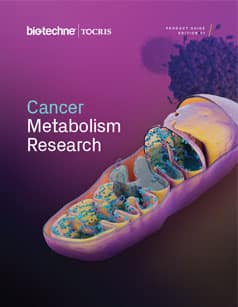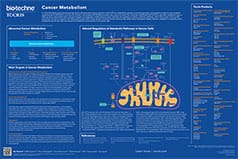Lactate Dehydrogenase A
Lactate Dehydrogenase A (LDHA; LDH5), EC 1.1.1.27, is one of five isoforms of the lactate dehydrogenase family. It catalyzes the conversion of pyruvate to lactate under anaerobic conditions and is key in the altered glycolytic metabolism that is a feature of cancer cells.
Lactate Dehydrogenase A Inhibitors |
|
|---|---|
| Cat. No. | Product Name / Activity |
| 4795 | Galloflavin |
| Lactate dehydrogenase inhibitor; impairs aerobic glycolysis | |
| 5189 | GSK 2837808A |
| Potent and selective LDHA inhibitor | |
| 5363 | NHI 2 |
| LDHA inhibitor | |
Lactate Dehydrogenase A (LDHA; LDH5), EC 1.1.1.27, is one of five isoforms of the lactate dehydrogenase family. It catalyzes the conversion of pyruvate to lactate under anaerobic conditions and plays a key role in the altered glycolytic metabolism that is a feature of cancer cells. LDHs are tetrameric enzymes comprising two different types of subunit, M and H; different combinations of these subunits result in five separate isoforms. LDHA, which is found mainly in skeletal muscle but also in tumors, consists of four M subunits.
LDHA is overexpressed in a wide range of tumors and is associated with the more aggressive cancer phenotypes and poor prognosis. Expression of LDHA is regulated by hypoxia inducible factor-1 (HIF-1) and the oncogene c-Myc. The enzyme is necessary for tumor maintenance, since cancer cells rely on glycolytic metabolism for energy, whereas it is not essential for normal healthy cells that rely on oxidative phosphorylation. Inhibition of LDHA has been shown in animal models to reduce tumor growth, increase oxidative stress and induce apoptosis. The enzyme is therefore being evaluated as a therapeutic target in cancer metabolism.
External sources of pharmacological information for Lactate Dehydrogenase A :
Literature for Lactate Dehydrogenase A
Tocris offers the following scientific literature for Lactate Dehydrogenase A to showcase our products. We invite you to request* your copy today!
*Please note that Tocris will only send literature to established scientific business / institute addresses.
Cancer Metabolism Research Product Guide
This product guide reviews some of the main areas in cancer metabolism research and lists around 150 products that can be used to investigate metabolic pathways in cancer including:
- Glycolysis
- Tricarboxylic Acid Cycle
- Lipidogenesis
- 1C Metabolism and Nucleic Acid Synthesis
- Drivers of Metabolic Reprogramming
- pH and Redox Balance
Cancer Metabolism Poster
This poster summarizes the main metabolic pathways in cancer cells and highlights potential targets for cancer therapeutics. Genetic changes and epigenetic modifications in cancer cells alter the regulation of cellular metabolic pathways providing potential cancer therapeutic targets.

